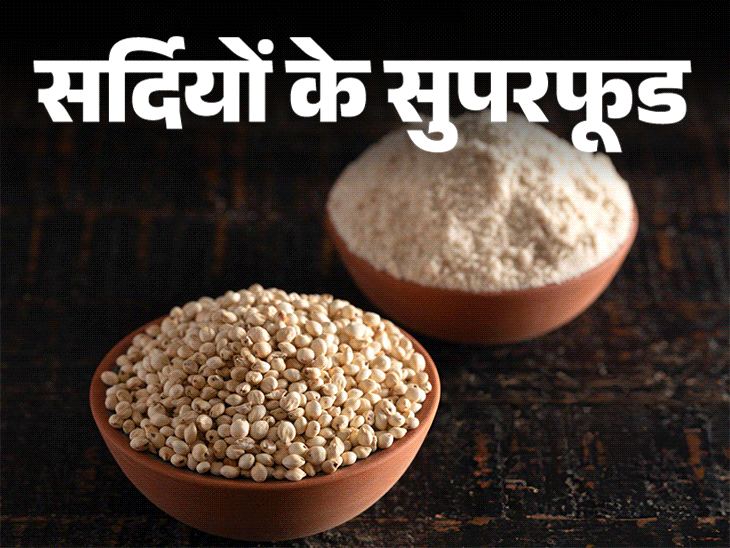“Winter superfood” Today’s food in the series is Jowar.
If you ask your grandmothers about jowar, they will tell you many stories about its amazing taste. In winter, most elders remember the delicious jowar rotis.
About 5,000 years ago, sorghum was grown on a large scale in Australia, Africa, Asia and Central America. It used to be an important part of people’s diets. Now wheat has taken its place. However, in recent years, the demand for jowar has increased in Hubli, Karnataka, and has increased again in Australia and America.
Jowar is still cultivated on a large scale in India. Its green leaves are first given to animals. When the sorghum harvest is ready, it is used as a cereal. Sorghum is the fifth most consumed cereal in the world.
Jowar is known as much for its incredible taste as for its nutrients. Jowar helps in weight loss, safe for people with diabetes. It is anti-inflammatory and also contains anti-cancer elements.
That’s why today in the “Winter Superfoods” series, we will talk about jowar. You will also learn that-
What is its nutritional value? Eating jowar reduces the risk of which diseases?
Sorghum is gluten free
Sorghum is a gluten-free cereal. This means that eating sorghum is safe for most people. This cereal is also safe for people with gluten intolerance. It can be cooked and eaten without other vegetables or grains. However, its flour is usually prepared and consumed.
Nutritional value of jowar
Jowar contains important nutrients like fiber, carbohydrates and proteins. Due to which the body gets the necessary energy and digestion becomes easier. Due to the presence of protein, the stomach remains full for a long time. So helps in losing weight.
Discover its nutrients in the graph:
Sorghum contains essential vitamins and minerals
Jowar is rich in vitamin B6. It contains minerals essential to the body such as potassium, calcium and iron. It is thanks to their presence that jowar is so beneficial for health. To what extent the daily needs of the body are met thanks to this, see in the graph:
Eating jowar is beneficial for health
Eating Jowar improves the digestive system. Eating it helps control blood sugar levels. This is why it is also beneficial for people with diabetes. Jowar is rich in many nutrients, including vitamin B. This activates metabolism and helps in the development of nerve cells. This keeps the skin and hair healthy.
Thanks to important minerals like magnesium, blood pressure remains under control and heart health remains good. Apart from this, what are the other benefits of eating jowar, see in the chart:
Some common questions related to Jowar and their answers
Question: How much jowar can you eat in a day?
Answer: If you prepare jowar rotis and eat them, you can eat them daily. This means you can eat jowar rotis in two servings a day.
Before wheat, jowar rotis were commonly eaten in India. Jowar is still used as a primary grain in many countries. This means that eating jowar is completely safe. There’s no need to measure or weigh your limits, but overeating can cause bloating or stomach pain.
Question: Can eating jowar cause any side effects?
Answer: In general, it is safe to eat jowar. However, it can also have side effects. Such as-
Gas and bloating may occur. Some people may have allergic reactions. This can cause asthma or trigger its symptoms. If they take diabetes medication, blood sugar levels may be low.
Question: Can eating jowar cause gas and bloating?
Answer: Yes, eating jowar can cause gas and bloating. Sorghum contains a fiber called fructans, which can cause gas and bloating. If a person suffers from irritable bowel syndrome (IBS) or any other type of digestive problem, the symptoms can be serious.
Question: Can eating jowar cause allergic reactions?
Answer: Yes, eating jowar can cause allergic reactions in some people. This may cause rashes on the body or difficulty breathing. This can cause swelling of the nose. Symptoms like asthma and skin allergies may appear.
Question: Is it safe for pregnant women to eat jowar?
Answer: Yes, according to the US Food and Drug Administration (FDA), jowar is safe for everyone. Pregnant women, children and the elderly can all eat it.
Thanks to this, pregnant women can benefit from adequate nutrition. Children can benefit from support in their physical and mental development. The digestion of elderly people will remain good and the immune system will also become stronger.
Question: Is it safe for people with diabetes to eat jowar?
Answer: Jowar is a good option for people with diabetes. In fact, the glycemic index and glycemic load of jowar are very low. Therefore, doctors advise diabetic patients to eat jowar.
If someone is taking medication to control their blood sugar, they should eat jowar in a limited manner as it can cause their blood sugar to drop very significantly.
Question: Who should not eat jowar?
Answer: These people should not eat jowar:
Those who suffer from irritable bowel syndrome (IBS) or any digestive problem. People who have kidney stone problems. People who have thyroid problems.
………………………….. from the winter superfoods series 1. Superfoods of winter – Zinc and magnesium Millet is a treasure: Gluten-free, easy to digest, keeps sugar under control.
Eating marketa keeps blood sugar levels under control, bones become strong and cholesterol levels decrease. Eating it also reduces the risk of asthma and cancer. … 2. Winter Superfood – A piece of jaggery a day will save you from anemia: Make periods regular, beneficial during pregnancy.
Eating jaggery increases the energy level. Besides many essential vitamins, it also contains important minerals like iron, magnesium and calcium. It prevents the risk of anemia and is extremely beneficial against joint pain. …

